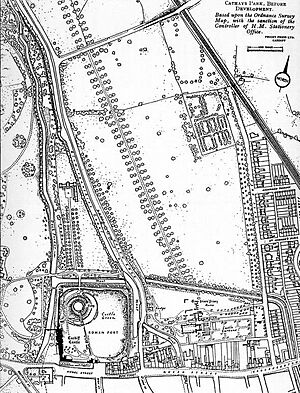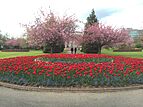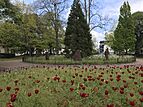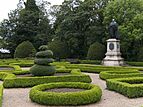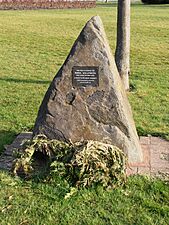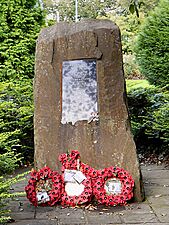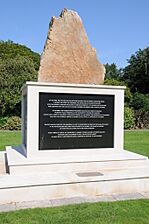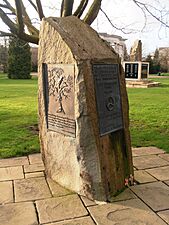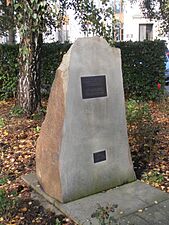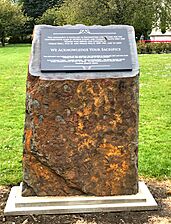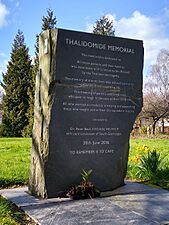Cathays Park facts for kids
Quick facts for kids Cathays Park |
|
|---|---|
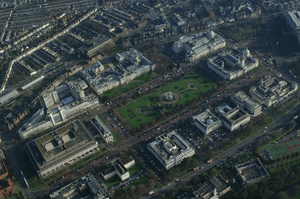
Aerial view of Cathays Park
|
|
| Type | Civic centre |
| Location | Cardiff, Wales |
| Created | Early 20th century buildings |
Cathays Park (which is Parc Cathays in Welsh) is a special area in the heart of Cardiff, the capital city of Wales. It's known as a civic centre, which means it's a place where important government and public buildings are located. Imagine a beautiful park surrounded by grand buildings!
Many of these buildings were built in the early 1900s, during the Edwardian era. You can find places like the Temple of Peace, City Hall, the National Museum and Gallery of Wales, and several buildings that belong to Cardiff University. It's also home to the Cardiff Crown Court, where important legal cases are heard, and the main offices for the Welsh Government.
Experts have called Cathays Park "the finest civic centre in the British Isles" because of its beautiful design and important buildings. It's a protected area, meaning its special character is kept safe for everyone to enjoy.
Contents
The Story of Cathays Park
Long ago, Cathays Park was part of the large grounds of Cardiff Castle. The way it looks today is thanks to a powerful family called the Marquesses of Bute, especially the 3rd Marquess of Bute, who owned a lot of land and was very wealthy.
People started thinking about making Cathays Park a public space in the late 1800s. In 1892, Lord Bute agreed to sell a part of the land for £120,000. There was some debate about moving the Town Hall there, but it was also suggested to build a new university college.
In 1898, the local council bought the entire 59 acres of land from the Marquess of Bute for £161,000. As part of the deal, Lord Bute set strict rules: the land had to be used for public, cultural, and educational purposes, and its beautiful tree-lined avenues had to be kept.
Before the main buildings were constructed, a big exhibition was held in 1896. It featured a boating lake, a cycling track, and even an electric railway!
How the Civic Centre Grew
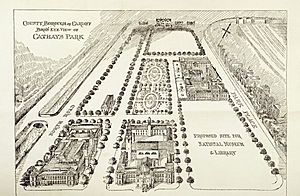
Cathays Park was built in three main stages. The first stage, in the early 1900s, featured grand buildings in a style called Edwardian Baroque. These included the University of Wales Registry, the main Cardiff University building, Cardiff Crown Court, Glamorgan County Hall, and Cardiff City Hall. The National Museum Cardiff started construction in 1912 but didn't open until 1927 because of World War I.
The second stage brought buildings with a simpler, classical design, like the Temple of Peace and Cathays Park 1.
Originally, there was a rule that no building could be taller than four storeys, so they wouldn't overshadow City Hall. This rule was later removed, leading to the third stage of building from the 1960s. These newer buildings, like the seven-storey Biosciences building and the twelve-storey Tower building, were built in a more modern style, though they still used the same light-colored stone as the older buildings.
In 1897, a competition was held to design the Law Courts and Town Hall. The winning architects, Lanchester, Stewart and Rickards, created two buildings that look very similar. They have beautiful sculptures on their roofs, representing things like "Science and Industry" or "Music and Poetry."
The National Museum of Wales was designed by Arnold Dunbar Smith and Cecil Brewer. Its design is a bit different from the City Hall, with a grand entrance hall. Building the museum took a long time because of World War I.
Later, government offices and university departments filled the remaining spaces. The Crown Buildings (now called Cathays Park 1 and 2) were built to house government workers. These buildings are so important that "Cathays Park" became a nickname for the Welsh Government itself!
Some people felt that the university built too many buildings, making the area feel a bit crowded.
Why Cathays Park is Special
Many experts agree that Cathays Park is truly amazing. One historian called it "the finest civic centre in the British Isles." Others have said it's a fantastic example of architecture that shows an important part of Welsh history. It helped Cardiff become recognized as a major city and the capital of Wales.
Important Buildings in Cathays Park
Many buildings in Cathays Park are "listed," which means they are protected because of their historical or architectural importance.
| Status | What it means |
|---|---|
| I | A building of exceptional interest, sometimes considered important worldwide. |
| II* | A particularly important building with more than special interest. |
| II | A building of national importance and special interest. |
Here are some of the key buildings you can find in Cathays Park:
- City Hall (Grade I listed): A grand building opened in 1906, designed by Lanchester, Stewart and Rickards.
- Cardiff Crown Court (Grade I listed): Also designed by Lanchester, Stewart and Rickards and opened in 1906.
- National Museum and Gallery of Wales (Grade I listed): Opened in 1927, it houses amazing art and natural history collections.
- Glamorgan Building (Grade I listed): A beautiful building that was once the county council headquarters, opened in 1912.
- Cardiff University main building (Grade II* listed): The main building for the university, completed in 1905.
- Welsh National War Memorial (Grade II* listed): A memorial to those who served in wars, unveiled in 1928.
- Bute Building (Grade II listed): Part of Cardiff University, opened in 1916.
- Temple of Peace (Grade II listed): A building dedicated to peace and health, opened in 1938.
- University of Wales, Registry (Grade II listed): An important university administration building, opened in 1904.
- Cathays Park 1 (Grade II listed): Part of the government offices, opened in 1938.
Beautiful Gardens and Green Spaces
Cathays Park isn't just about buildings; it also has lovely gardens and green areas. These gardens were mostly created between 1903-1906 and 1924-1928. They are considered historically important and add a lot to the city's beauty.
Alexandra Gardens
Named after Queen Alexandra, this 5-acre garden is right in the middle of Cathays Park. It has beautiful flower beds and green grass, with the Welsh National War Memorial at its center. Since 2019, it's been protected as a "Centenary Field" to honor those who died in World War I.
Gorsedd Gardens
This 2-acre garden used to be called Druidical Gardens. Its most famous feature is a stone circle that was built in 1899 for the National Eisteddfod of Wales, a big Welsh festival. The garden's name comes from the Gorsedd of Welsh Bards, a group that organizes the Eisteddfod. You can also find statues of important people like David Lloyd George here.
The Gorsedd Gardens also have a "tree of life" planted in 1994 to remember those who lost their lives to AIDS in Wales. It's a place for yearly commemorations and has become a spot for people to gather and remember important events.
Friary Gardens
Friary Gardens is a 1-acre triangular garden that was designed like a traditional Dutch garden. When the land was sold, one of the rules was that no buildings could ever be built on this spot, and the trees had to be kept. It was originally part of an old Franciscan friary, which is why it's called Friary Gardens. You can see a statue of the 3rd Marquess of Bute here.
Other Green Spaces
- Queen Anne Square is a tree-lined grass square at the north end of the park, surrounded by houses.
- Parc Mackenzie is a newer green space opened in 2023, named after Millicent Mackenzie, the first woman professor in Wales.
- The City Hall Lawns have a fountain that was created in 1969 to celebrate Prince Charles becoming the Prince of Wales. These lawns are often used for fun events like Cardiff's annual Winter Wonderland.
- The Crown Gardens used to be formal gardens but were built over in the 1970s to create the new Crown Buildings (Cathays Park II).
Statues and Sculptures
Cathays Park is home to many statues and sculptures that honor important people and events.
| Name | Sculptor | Year | Listed status | Image |
|---|---|---|---|---|
| Statue of Third Marquess of Bute | James Pittendrigh Macgillivray | Early 20th century | II | |
| Statue of John Cory | Goscombe John | 1906 | II | |
| Statue of Lord Aberdare | Herbert Hampton | 1898 | II | |
| Statue of Lord Ninian Edward Crichton Stuart | Goscombe John | 1917 | II | |
| Statue of David Lloyd George | Michael Rizzello | 1960 | II | |
| Statue of Godfrey, First Viscount Tredegar | Goscombe John | 1909 | II | |
| Statue of Judge Gwilym Williams of Miskin | Goscombe John | Around 1906 | II | |
| South African War Memorial (also known as the Boer War Memorial) | Albert Toft | 1909 | II* | |
| Statue of Girl in Gorsedd Gardens | Robert Thomas | 2005 | No listing | |
| Three Obliques (Walk In) (Sculpture in front of the Music Building) | Dame Barbara Hepworth | 1968 | II | |
| Relief Sculpture on Redwood Building | Edward Bainbridge Copnall | 1961 | No listing | |
| Mind's Eye (Relief sculpture on the Tower lecture theatre) | Peter Randall-Page | 2006–2007 | No listing |
Memorial Stones
-
A memorial to Raoul Wallenberg, a Swedish diplomat who saved many Jewish lives during World War II. Unveiled in 1985.
-
The Cardiff City Falklands Conflict Memorial, remembering seven servicemen from Cardiff who died in the Falklands War.
-
A memorial for those who fought in the International Brigade during the Spanish Civil War, unveiled in 1992.
-
The Gift of Life Stone, dedicated to organ donors. Erected in 2007.
-
A memorial to celebrate the lives and achievements of people affected by Thalidomide in the UK. Unveiled in 2016.
Gates and Other Features
You'll also find interesting gates, colonnades (rows of columns), and obelisks (tall, narrow monuments) around Cathays Park.
| Feature Name | Listing status | Image |
|---|---|---|
| Forecourt Walls to University of Wales Main Block | II* | |
| Colonnade and gateways at south end of Queen Anne Square | II | |
| Pair of Obelisk Lamp Stands to west of City Hall Pair of Obelisk Lamp Stands to south west of City Hall Pair of Obelisk Lamp Stands to south east of City Hall Pair of Obelisk Lamp Stands to south west of Crown Court Pair of Obelisk Lamp Stands to south east of Crown Court |
II |


